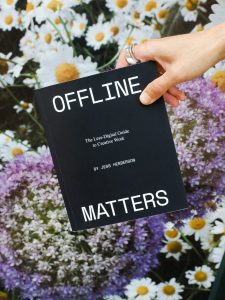The following is an excerpt from my new book Offline Matters: The Less-Digital Guide to Creative Work, which can also be found in the current print issue of Amsterdam Alternative newspaper.
Shock Me. Please.
On Pervasive Boring Creativity
Who knew living ‘a creative life’ would feel so arid? Where is the joy, the excitement, the risk, or the shock? Nothing is shocking besides the diminishing sense of possibility – and the working conditions. The work is safe, predictable, and supposedly ‘predicted’. All conforming to predetermined directives.
It’s not a matter of standing out, it’s a matter of fitting in and doing that very well. Future Shock. Present Shock. The Shock of the New. Do we even know how to feel shock anymore? We’re talking real shock – confused, challenging, discomfort-at-oddity shock. Not the shock one is ‘supposed’ to feel. Not the play shock that follows looking around and see others acting shocked, then following along accordingly – hazarding a guess that it’s simply the correct reaction to be done.
Except, nothing is being done. What are we really doing here? What are we even creating now? More ‘engaging content’ to exasperate the masses, complicit in the contemporary zombie condition? More riffs on past styles, never-ending re-runs of previous cultural moments? More distractions and ever-cooler ways to say ‘spend, spend, spend!’ without quite saying it? Boring.
‘We are surrounded by worn-out, banal, useless and exhausted images, limping and dragging themselves behind the rest of our cultural evolution.’
–Werner Herzog
This work is the boredom of having to come up with ideas to be ‘sold in’ using images of other existing creations. Mood boards, visual concept presentations, mini reels remixed from found footage. The client or the boss needs to see what they’re paying for before it has been made.
They perceive this as low risk, a way to gain a sense of security. They know upfront exactly what they are agreeing to and what they will get. This forms a promise that is 100% based on past creations. You agree to recreate the assemblage shown them. To deviate in any way will be problematic, both to the project and the relationship. Creative work is boring when it is only history repeating. Whether or not originality is still possible is a separate issue. Either way, there is no possibility for it to arise in this process. And we wonder privately why there is nothing new anymore.
‘Only boring people get bored’ said snarky parents and teachers. A phrase that rings out with pangs of guilt. Am I boring? Boredom can be a protective barrier from the world. It’s not a boredom of your deep self, rather a psychic armour. These are not qualities of the individual. They manifest as barricades made from the mass celebration of mediocrity. Don’t stand out, blend in. Appropriate and imitate. Only a rebellious mind will fear this state and seek to act.
‘I don’t have time to make newness.’
–Anonymous precarious graphic designer, March 2020.
From an overheard conversation.
No Thraldom. Just Boredom.
Is boredom a condition of possibility for creativity? Like the mindlessness conjured by taking a shower or a long walk. These situations seem closer to a mind free from burden or concern. Space-clearing practices. A breather for a moment away, that may just turn into an exciting moment with. Office-bound boredom, performative-process boredom, overdone-rehashings-of-predictable-ideas-and-strategies-gone-before boredom. These are the boredoms of limitation. The boredoms of ‘playing it safe.’ The boredoms that come from adherence to supposed certainty of result. The boredom of a decision made because everyone else is doing it. These are forms of boredom that are just numb anticlimax and nothing more. Weirdness has vacated the scene. There’s nothing obscure. The sensation of surprise is nowhere to be found. Everything is serious. Empty of exuberance. Sorry (not sorry) to puncture the fantasy of joyful participation.
What happened to youthful rebellion, experimentation, interventions, willful acts of destruction, the attitude to tell what sucks to fuck off, and the expressive pleasure of challenging what you dislike? Is this twee and are there ways to respond without being re-packaged back into yet another commodity for sale? Imagination and critical thought can generate forms of counter-power. The challenge is their life as a non-constitutive element in the reproduction of capital. It’s about making a transgressive new propaganda ensemble. From us!
‘You have to keep trying to make an experiment work. You have to keep writing this particular story, not some story in general.’
–Donna Haraway
Shocking and related nonetheless – during all of this one must remember that in creativity-as-work, negativity is not allowed. Great! Love it! So badass!!! Be positive or be penalised. Your lack of ‘spirit’ will be held against you. You will be labelled a dark cloud, and nobody wants to work with a dark cloud. You’re required to ‘bring the good vibes’ no matter what the truth is. Dissatisfaction or despair are fast tickets to the unemployment desert. Not to mention the social one. Which would you prefer: to be deserted or to keep it phoney and keep the job? Who’s more boring: Negative Nelly or Overly Optimistic Oli?
About the book Offline Matters
Offline Matters is a compendium of radical strategies for the creative worker.  The handbook results from three years of research conducted on the inside of the creative industries, where technodeterminism dominates workplaces, exploitation and burnout continue to rise, and ideas forever churn out as dull marketing noise. Find out more about it here.
The handbook results from three years of research conducted on the inside of the creative industries, where technodeterminism dominates workplaces, exploitation and burnout continue to rise, and ideas forever churn out as dull marketing noise. Find out more about it here.
Read a recent interview on how the book came to be – Interview: Jess on ‘Offline Matters’ with MAEKAN

